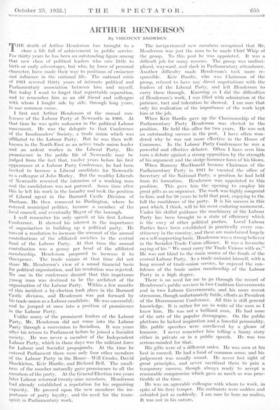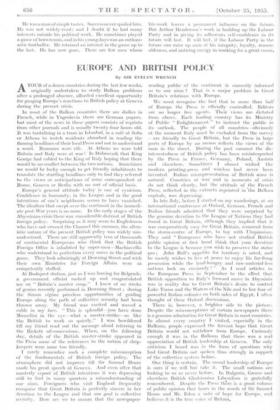ARTHUR HENDERSON
By VISCOUNT SNOWDEN TILE death of Arthur Henderson has brought to a close a life full of achievement in public service. For. thirty, years he has been an outstanding figure among that new • class of political leaders who owe little to birth-or early advantages, but who,, by force of personal character, have made their way to positions of eminence and influenee in the national life. The national crisis of 1931 severed thirty years of intimate political and Parliamentary association between him and myself. But today I want to forget that regrettable separation, . and to remember him as an old. friend and colleague with whom I fought side by side, through' long years, in our common cause.
I first met Arthur Henderson at the annual con- ference: of the Labour Party at Newcastle in 1903. At that time he was quite unknown in the political Labour movement. He was the delegate to that Conference of the Ironfounders' Society, a trade Union which was 'affiliated to the Labour Party. But he was then well- known in the North-East as an active trade union leader and an ardent worker in the Liberal Party. His prominence in the public life of Newcastle may be judged from the fact that, twelve years before his first appearance at a Labour Party Conference, he had been invited to become a Liberal candidate for Newcastle as a colleague of John Morley. But the wealthy Liberals of Newcastle resented the intrusion of a working man and the candidature was not pursued. Some time after this he left his work in the foundry and took the position of Liberal agent in the Barnard Castle Division of Durham. He then removed to Darlington, where he entered municipal politics, became a member of the local council, and eventually Mayor of the borough. remember his only speech at his first Labour Conference. It showed his interest in the importance of organisation in. building up a political. party. He moved a resolution to increase the amount of the annual contributions of the. affiliated societies to the central fund of the Labour Party. At that time the 'annual contribution was a penny per head of the affiliated membership. Henderson proposed to increase it to threepence. The trade unions at that time did not Share Mr. Henderson's view of a sound financial basis for political organisation, and his resolution was rejected. No one in the conference dreamt that this impetuous young man was destined to be the architect of the organisation of the Labour Party. Within a few months of this incident a by-election took place in the Barnard Castle division, and Henderson was put forward by his trade union as a Labour candidate. He was successful; and he jumped at once into a position of prominence in the Labour Party.
.1 Unlike many of the prominent leaders of the Labour Party, Mr. Henderson did not come into the Labour 'arty through a conversion to Socialism, It was years after his return to Parliament before he joined a Socialist society. He was never a member of the Independent Labour Party, which in those days was the militant force for Labour and Socialist propaganda. At the. time he entered Parliament there were only four other members of the Labour Party in the House----Will Crooks, David Shackleton, Keir Hardie, and Richard Bell. The small- ness of the number naturally gave prominence to all the .inembersof the party. At the General Election two years later Labour returned twenty-nine members. Henderson had already established a reputation for his organising Capacity. He pressed upon the new members the irri Portance of party loyalty, and the need for the team- spirit in Parliamentary work. The ine-xperienced new members recognised that Mr. Henderson was just the man to be made Chief 'Whip of the group. To this post he was appointed. It was a difficult job' for many reasons. The group was undisci- plined, wayward, and slack in Parliamentary attendance. Another difficulty made Henderson's task more re- sponsible. Keir Hardie, who was Chairman of the group, refused to have any direct negotiations with the leaders of the Liberal Party, and left Henderson to carry these throUgh. Knowing as I did the difficulties of Henderson's work, I was filled with admiration at the patience, tact and toleration he showed. I am sure that only his realisation of the importance of the work kept him at the job.
When Keir Hardie gave up the Chairmanship of the Parliamentary Party Henderson was elected to the position. He held this office for two years. He was not an outstanding success in the post. I have often won- dered why he was not more effective in the House of Commons. In the Labour .Party Conferences he Was a powerful and effective debater. Often I have seen him turn a debate against a, strong opposition by the strength of his argument, and the sledge-hammer force of his blows.
When Ramsay MacDonald became Chairman of the Parliamentary Party in 1911 he vacated the office of Secretary of the National Party, a position he had held from its formation. Henderson was appointed to this position. . This gave him the opening to employ his great gifts as an organiser. The work was highly congenial to him, and for 20 years he held that post, enjoying to the full the confidence of the party. It is his success in this post which, I think; will be 'his most enduring monument. Under his skilful guidance 'the machinery of the Labour Party has been 'brought to a state of efficiency which is the envy of other political parties. Local. Labour Parties have been established in practically every con- stituency in the country,and these are maintained largely on a self-supporting basis. Henderson was a strong believer in the Socialist-Trade Union alliance. It was a favourite saying of his " We must carry the Trade Unions with us." He was not blind tO the main source of the funds of the central Labour Party. As a trade unionist himself, with a long record- trade-union service, he enjoyed the con- fidence of the trade union membership of the Labour Party in a high degree. There is no need for me to go through the record of Henderson's public services in two Coalition Governments and in two Labour Governments, and his more recent strenuous, though unfortunately futile, efforts as President of the Disarmament Conference. All this is still general knowledge: It is ,rather for me to write of the man as I knew him. He was not a brilliant man. He had none of the arts of the popular demagogue. On the public platform he lacked inspiration and a forceful personality. His public speeches were unrelieved by a gleam of humour. I never remember him telling a funny story either in private or in a public speech. He was too serious-minded for that.
His gifts were of a different order. He was seen at his best in council. He had a fund of common sense, and his judgement was usually sound. He never lost sight of great principles, and never sacrificed them to gain a temporary success, though always ready to accept a reasonable Compromise which gave as much as was prac- ticable at the time.
He was an agreeable colleague with whom to work, in spite of his fiery temper. His outbursts were sudden and subsided just as suddenly. I am sure he bore no malice. It was not in his nature. He was a man of simple tastes. Success never spoiled him. He was not widely-read ; and I doubt if he had many interests outside his political work. He sometimes played a game of lawn tennis, and in his young days was an enthusi- astic footballer. He retained an interest in the game up to the last. He has now gone. There are few men whose life-work leaves a permanent influence on the future. But Arthur Henderson7s work in building up the Labour Party and in giving its adherents self-confidence in its future will last. It will last, if the Labour Party in the future can raise up men of his integrity, loyalty, reason- ableness, and untiring energy in working for a great cause,



























































 Previous page
Previous page